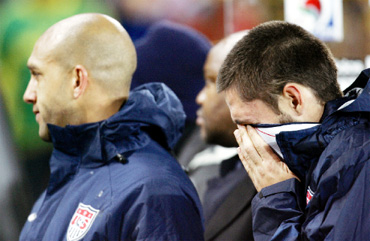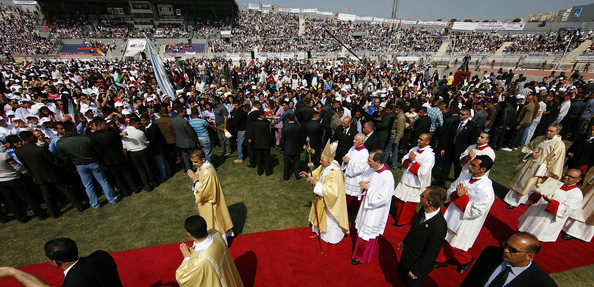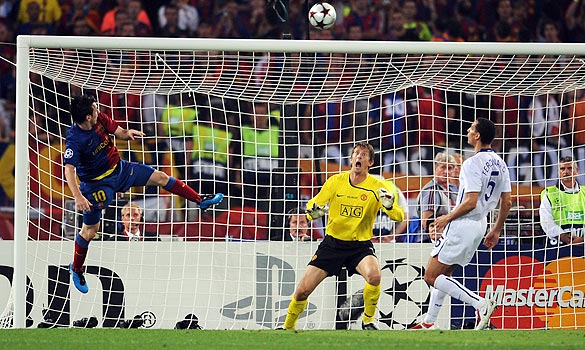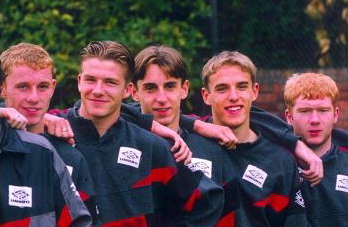ESPN’s Outside the Lines sent its presenter, Bob Ley, to South Africa to report on the preparations for the World Cup. It is an informative, fair piece in stark contrast with the nonsense published in the UK press, including in The Guardian. You can watch the rest of the report at the program’s website (scroll down and look on the right).
Author: Editor
Goal of the Week
While most other European leagues are on break, competitive football is being played in Scandinavia. Like in Norway. There, Hunter Freeman, an American defender playing at Premier League club, I.K. Start, scored a freak goal from about the halfway line in a league game earlier this week.
‘USA a team of extremes’

The United States’ Confederations Cup adventure generated a wide variety of reactions in America: pride in a strong effort, disappointment at letting a trophy slip away and, understandably, puzzlement. After all, not many squads can look awful against Brazil one week then nearly beat them the next. “Which team will show up during the rest of World Cup qualifying, as well as in South Africa next summer?” wrote ESPN’s Jeff Carlisle. “Will it be the side that struggled early during the tournament or the one that finished with a flourish, even in losing a heartbreaking final to Brazil?”
A likely answer is: both. Instead of fretting over the US’s baffling form, however, we should revel in it. The traditional soccer narrative of the United States, dating to the 1970s, highlights the country’s supposedly enormous potential. But rather than waiting another few decades for the US to become a power, why not embrace its unpredictable, quirky side?
True, the current edition of this team is infuriatingly inconsistent. But at least it’s a marvel of inconsistency. Whereas Mexico always lose in the second round of the World Cup – yawn – the United States’ sheer unpredictability makes the team worth following. In June alone, Team USA was routed by Costa Rica in World Cup qualifying, then confidently snapped Spain’s three-year unbeaten run.
While all teams have peaks and valleys over time, the US frequently packs them into 90 minutes. Consider the World Cup campaign. In El Salvador in March, the US played a horrible 75 minutes to fall behind 2-0, before a frantic rally produced two late goals and further untaken chances. At home to Honduras in June, the US fell behind within five minutes before scratching out a victory – an uneven performance personified by Carlos Bocanegra, who headed in the winner, then immediately got taken off with an injury after the restart. With these guys, good and bad are intertwined.
Impressively, the United States can produce these trademark half-good, half-dismal efforts against anyone. And they don’t always involve late rallies. Against Brazil and Italy in the Confederations Cup, fast starts and half-time leads were followed by three-goal second-half meltdowns. The excitement of sport comes from its uncertainty, does it not?
As a bonus, Team USA routinely makes blowhard pundits look silly. “We have raised a generation of boys as opposed to men in US soccer,” said Alexi Lalas after the slow start in the Confederations Cup. The national team then promptly rolled into the final. And while Lalas and fellow TV commentator John Harkes spew out ever-shifting prescriptions for coach Bob Bradley – better attitude, more domestic players, more steel in midfield – the reality is that no one knows how the team will perform at any time. As Tim Howard said after the 3-0 win over Egypt: “We are scratching our heads just like you guys.” Who needs experts? This team calls into question the whole premise of expertise.
Ultimately, it’s futile to extract lessons about the national team’s long-term future from every match. The future is already here, and the US has firmly established itself. Not as a world power, but as one of those rare national teams – think Portugal or Nigeria – whose mystifying form is itself an attraction. Granted, this is not what many American fans desire most, given their expectations of sporting dominance. But for some of us, it’s a welcome state of affairs.
Peter Dizikes in (the British) When Saturday Comes.

The Vatican has weighed in on Real Madrid’s nearly $300 million spending spree for three players (Cristiano Ronaldo, Kaká and Karim Benzema). The Vatican’s newspaper, Osservatore Romano, said in an editorial that exorbitant transfer fees would bankrupt teams and could increase the influence of organized crime. “It is good to ask oneself whether the figures paid by Real Madrid’s president in a period of economic and financial crisis are justifiable from a purely economic viewpoint or whether they are inexplicable even under market laws,” the editorial said. “It is also necessary to see whether they are compatible with, or destabilizing for, the soccer world.
[Via Goal]
Goal of the Week
Futsal player, Falcao, scores for Brazil in a match against Romania (which Brazil eventually won by 12-0) in Futsal Grand Prix International Tournament held in Brazil. The Spanish newspaper, MARCA, anointed it the greatest indoor football goal ever. Some bloggers, like The Spoiler (who we read religiously), got so carried away that they decided it must be Falcao, who starred for Brazil at the 1982 World Cup in Spain. That would make this guy in the video 55 years old.
Football or soccer?

It’s worth reposting blogger Ethan Armstrong’s (of EPL Talk) take on the dispute over naming rights:
The end of an era at Manchester United

The transfer of Cristiano Ronaldo to Real Madrid is not the only end of an era at Manchester United. An Educated Right Foot blogs on the passing of another era at the club:
It has for years been the axis around which Man United have flourished, but it looks like the end is nigh for the stars of [the] 1992 FA Youth Cup. David Beckham left for Real Madrid in 2003, while Nicky Butt went the other way, to Newcastle in 2004. Meanwhile, with lesser clubs interested in their aged legs, Paul Scholes and Gary Neville look set to follow this summer. That leaves Ryan Giggs, who somehow won Player of the Year this season, but whose performance in the Champions League final, more or less, made him look better suited to the Welsh team than ever, and essentially epitomised his form over the last few years: slow and wasteful. I wouldn’t expect him to play much of a role in next season’s campaign. Goodbye, then, lads. We hardly knew ye.